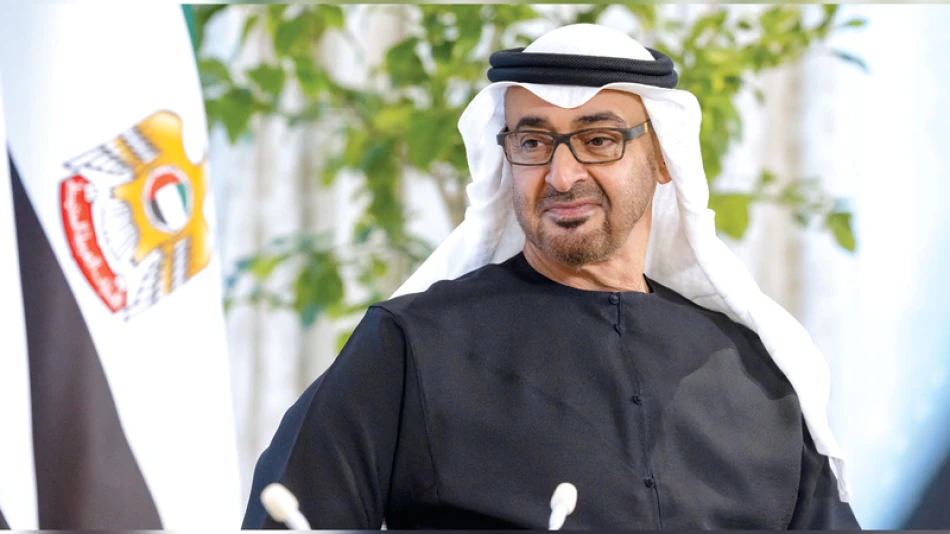
State Leader Appoints Maryam Bint Mohammed as Chair of the Mohammed bin Zayed Humanitarian Foundation
UAE Launches Ambitious $500M Humanitarian Foundation to Reach Half a Billion People
The UAE has established the Mohammed bin Zayed Foundation for Humanitarian Impact, a major new philanthropic initiative aimed at reaching over 500 million people across 50 countries in Asia and Africa within five years. Led by Sheikha Maryam bint Mohammed bin Zayed Al Nahyan, the foundation represents the Emirates' most ambitious humanitarian outreach program to date, focusing on global health, emergency relief, and sustainable development.
Leadership and Vision
UAE President Sheikh Mohammed bin Zayed Al Nahyan has appointed his daughter, Sheikha Maryam bint Mohammed bin Zayed Al Nahyan, as president of the foundation, with Sheikh Hamdan bin Mohammed bin Zayed Al Nahyan serving as vice president. Both appointees already hold senior positions within the Presidential Court, bringing institutional experience to their new humanitarian roles.
Sheikha Maryam emphasized that the foundation extends the UAE's established charitable legacy while embodying the President's vision for global humanitarian work. "Carrying the trust of this noble humanitarian approach is both an honor and a responsibility," she stated, highlighting the foundation's commitment to investing in human progress and empowerment.
Strategic Focus Areas
Global Health Priorities
The foundation will prioritize sustainable efforts in global health, supporting international health priorities and enhancing human capabilities. This aligns with the UAE's growing influence in global health diplomacy, following its successful hosting of COP28 and increasing involvement in World Health Organization initiatives.
Emergency Response Capabilities
Beyond long-term development, the foundation will maintain rapid response capabilities for humanitarian emergencies. This dual approach—combining immediate relief with sustainable development—mirrors successful models employed by established foundations like the Gates Foundation and reflects lessons learned from recent global crises including the COVID-19 pandemic and climate-related disasters.
Geographic and Demographic Ambitions
The foundation's target of reaching 500 million people across Asia and Africa over five years represents one of the most ambitious humanitarian goals announced by any Gulf state. This scope positions the UAE alongside major global philanthropic players and reflects the country's strategic pivot toward soft power projection in the Global South.
The focus on Asia and Africa aligns with the UAE's broader economic and diplomatic strategy, as these regions represent key markets for Emirati investment and trade partnerships. The foundation's work could strengthen bilateral relationships while addressing genuine humanitarian needs in countries where the UAE already maintains significant economic presence.
Regional Context and Competition
This initiative comes as Gulf states increasingly compete for influence through humanitarian and development programs. Saudi Arabia's various foundations and Qatar's extensive charitable networks have established precedents for state-backed humanitarian outreach. The UAE's approach appears more centralized and ambitious in scale, potentially setting new standards for Gulf philanthropy.
The foundation also reflects the UAE's maturation as a global player, moving beyond traditional aid models toward comprehensive humanitarian impact programs that combine immediate relief with long-term development goals.
Implementation Challenges and Opportunities
Operating across 50 countries presents significant logistical and political challenges. The foundation will need to navigate diverse regulatory environments, establish local partnerships, and ensure cultural sensitivity in program delivery. However, the UAE's extensive diplomatic network and experience in international humanitarian coordination provide strong operational foundations.
The foundation's success will likely depend on its ability to leverage existing UAE institutions, including the Mohammed bin Rashid Al Maktoum Global Initiatives and the UAE's established disaster relief capabilities, while building new partnerships with international organizations and local implementers.
As global humanitarian needs continue expanding amid climate change, conflict, and economic instability, the Mohammed bin Zayed Foundation for Humanitarian Impact represents a significant addition to international relief capacity. Its ultimate impact will depend on execution quality and the UAE's sustained commitment to this ambitious humanitarian vision.
Most Viewed News

 Sara Khaled
Sara Khaled






